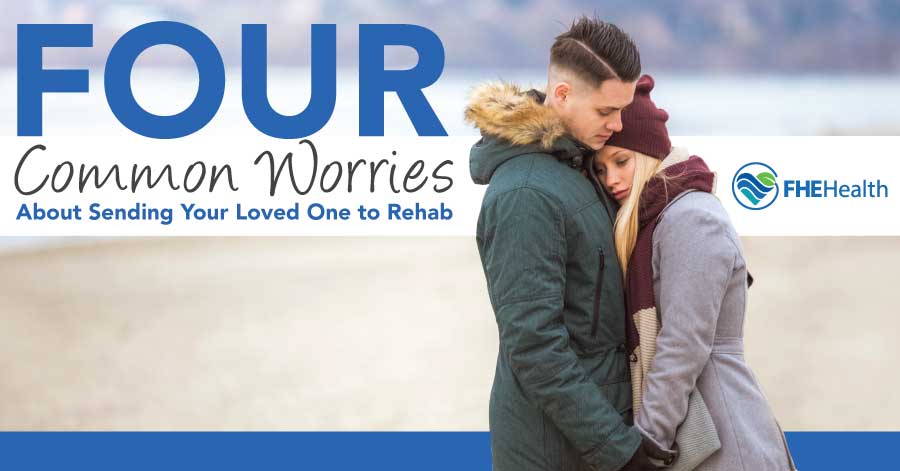
As a friend or loved one of an addict, it’s natural to be worried. What’s going to happen to them? What can you do to help a person you care about when they’re going through something like this?
Addiction can completely change a person, and sometimes you have to accept that you can’t be fully responsible for their well-being if they’re addicted to drugs or alcohol. There comes a time to help put a loved one into treatment at a place where they can get the care they need.
But this comes with a whole host of new worries. How qualified is the staff at the facility you choose? Will your loved one get the treatment and services they need to build a lasting recovery?
It’s natural to be worried about an unknown situation. Here we discuss some concerns you might have about sending a loved one into rehab, talk about the industry and explain how to find a treatment center you can trust.
How to Choose a Rehab Center
If you have to choose where a loved one receives treatment for their addiction, it’s likely you’re very close to them, making the situation tense. It’s also likely that you’ve watched them change into someone you no longer recognize, which puts a great burden on your ability to facilitate treatment.
Here are some things you need to consider when finding a rehab center for someone close to you.
What Type of Rehab Center is Best?
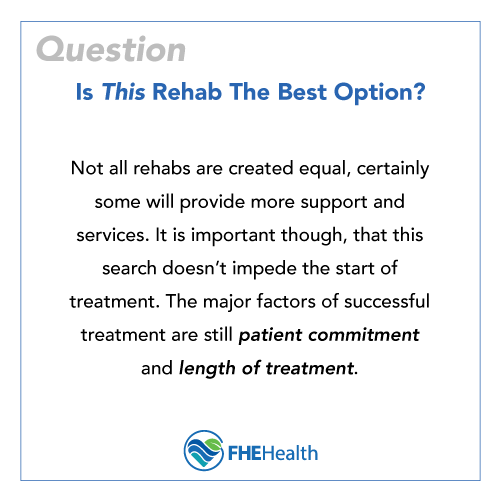 First, it’s important to remember that not all treatment centers are created equal, quality aside. There are treatment options that fall along various phases of the continuum of care, ranging from full-time residential treatment to part-time outpatient programs.
First, it’s important to remember that not all treatment centers are created equal, quality aside. There are treatment options that fall along various phases of the continuum of care, ranging from full-time residential treatment to part-time outpatient programs.
You may have a harder time getting your loved one to commit to inpatient treatment because it is full-time. Residential treatment forces patients to confront their problem head-on, with no misconceptions about being able to “stop at any time.”
It should be mentioned, though, that the National Institute on Drug Abuse (NIDA) guide to The Principles of Effective Treatment for addiction notes that the longer a person receives intensive treatment, the better their outcomes will usually be.
You want an option that can sufficiently address your loved one’s needs in a safe, distraction-free environment. Often, this does mean sustained, residential care, but it’s best to look for a facility that can support the transition from inpatient to outpatient treatment and every point in between.
How Do You Know What to Trust?
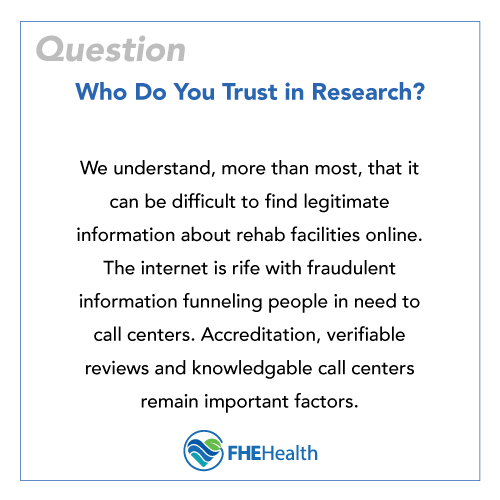 When choosing a rehab center, be careful not to be fooled by marketing. Many facilities say they can support recovery. You have to find one that backs up its claims with evidence.
When choosing a rehab center, be careful not to be fooled by marketing. Many facilities say they can support recovery. You have to find one that backs up its claims with evidence.
The best way to do this is to dig deeper. Verify accreditations, read reviews online and, if you have trusted friends and relatives who have had their own experiences with rehab centers in your area, ask them what separates high-quality treatment from the alternative.
Once you’ve narrowed down your options, come up with an intensive list of questions and request tours to ensure that the experience on the inside is as advertised.
What’s the Cost of Treatment?
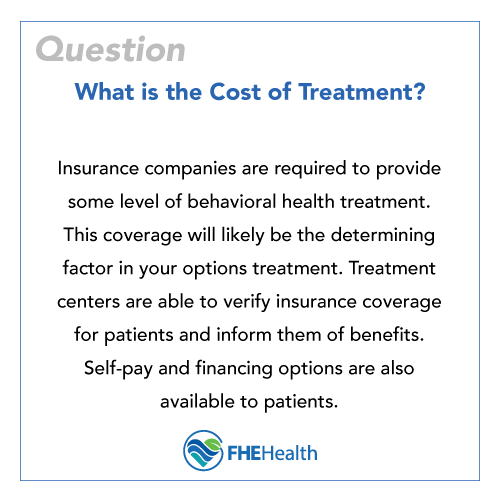 The cost of rehab can be significant, and it’s not uncommon to have some sticker shock the first time you ask about pricing. When you step back and consider the details, however, you start to see why rehab is a good investment.
The cost of rehab can be significant, and it’s not uncommon to have some sticker shock the first time you ask about pricing. When you step back and consider the details, however, you start to see why rehab is a good investment.
Consider the cost of checking into a hospital for a 30-day stay. We’re talking thousands of dollars, and only the most severe cases are even allowed to stay for that long. Rehab facilities are like extremely comfortable hospitals where patients receive a wide variety of services aimed at helping them recover.
When you consider that like hospitals, most rehab centers allow you to pay using your health insurance, you realize you’re actually getting a great value for your money.
Another thing to consider is the cost of not getting treatment. No one likes to put their loved one’s safety in terms of dollars and cents, but living sober is much more affordable for both of you than the potential risks of continued addiction.
Is Florida Safe for Rehab?
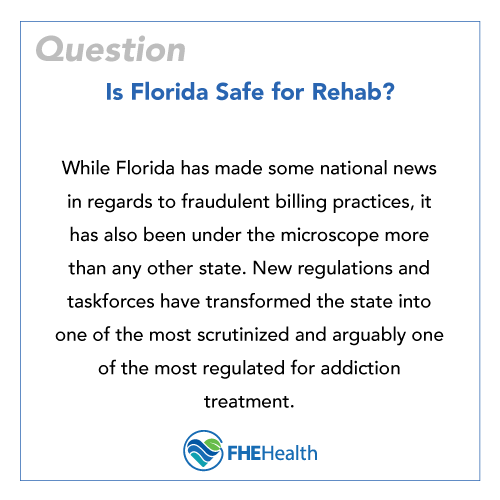 A few years ago, rehab centers in some areas of Florida such as Miami-Dade, Broward and Palm Beach counties experienced a scandal when it was discovered that they were home to scam rehab centers that actually provided their residents with drugs to keep them in treatment.
A few years ago, rehab centers in some areas of Florida such as Miami-Dade, Broward and Palm Beach counties experienced a scandal when it was discovered that they were home to scam rehab centers that actually provided their residents with drugs to keep them in treatment.
As a response, the state began a complete overhaul of the addiction treatment industry. This involved state regulators penalizing and shutting down these “pill mills” and establishing a much more rigorous process of regulation for the facilities that remained.
Knowing this history might make you wary of Florida, but it’s now one of the most heavily regulated states when it comes to the safety and quality of the rehab centers within its borders.
Understand Treatment Best Practices
It’s natural to be exploring ways to support your loved one as they enter into an addiction treatment program. Read what an expert from FHE Health has to say here on the topic of how to best help your loved one through recovery effectively.
One way to help is to do your research. Understand what the best practices are in any given scenario, whether your loved one is in a rehab center full-time or immersed in their recovery. Understand how to speak to them about their addiction, even when they haven’t yet admitted to having a problem, and learn how to communicate that no matter what happens, you’ll be right there by their side.
It’s important to show your loved one unconditional support. Recovery won’t be easy, but with your support, anything is possible.






